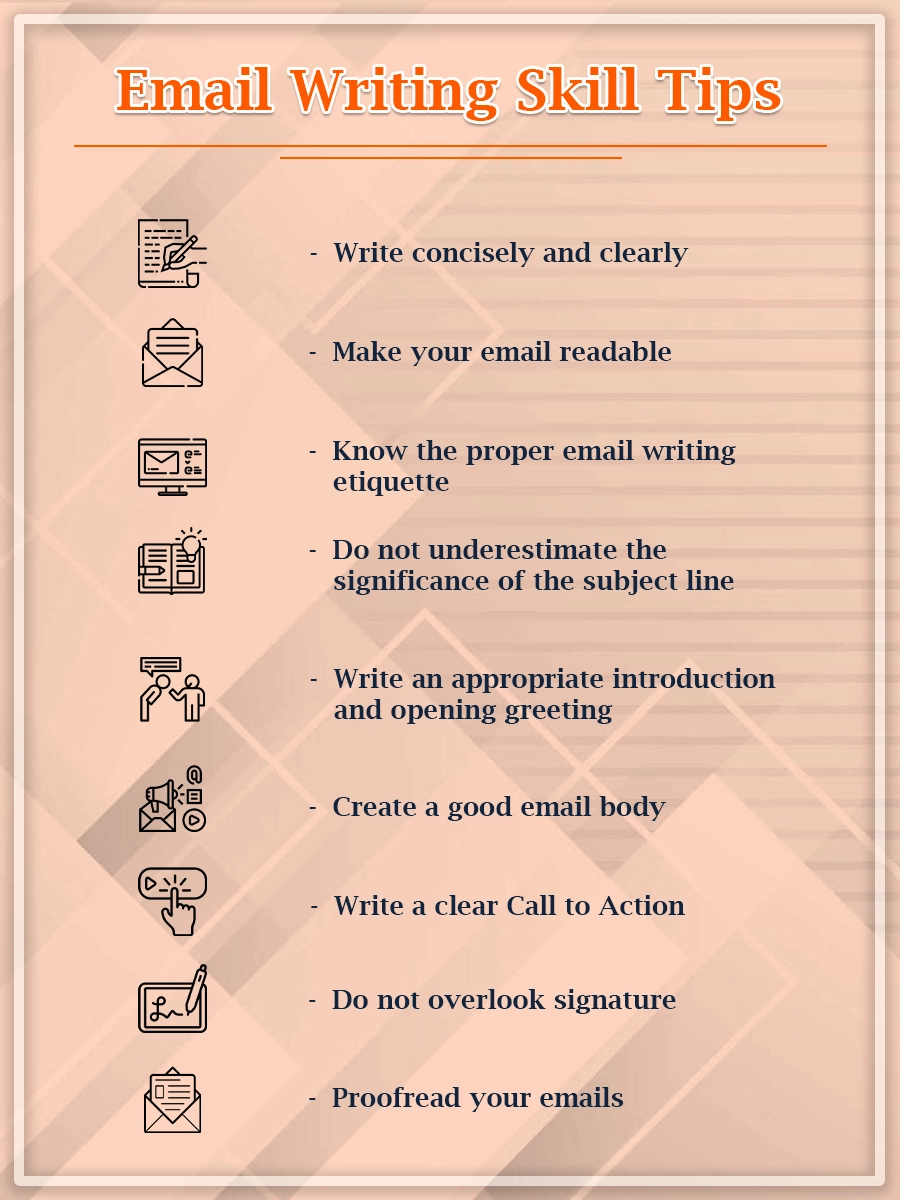It’s a known fact that working professionals need to communicate well. But if you think of the most dominant communication form in a professional setting, you’ll undoubtedly think about the email. A robust email writing skill is indeed imperative for effectively communicating with clients and other businesses. Recent studies show that an average business professional writes and sends nearly 43 business emails every day! In view of this fact, it’s only natural to polish your skill of writing effective emails. A simple and easy-to-read email can go a long way in conveying key information. But is it easy to be able to compose such an email? This article will help you achieve this feat, so you progress in your professional life.
Why Is Email Writing Skill So Important?
Email is hands down the primary medium through which professionals communicate with other companies and customers. However, if not composed carefully, it can lead to various problems afterward. Most people are in the dark about the effective way of writing an email.
Although email writing may seem like a hassle-free task, yet the aftermath of silly mistakes can ruin your reputation. It’s imperative when you need to communicate some important message. The whole process of writing it can feel intimidating. People commonly miscommunicate, which sends an incorrect impression of the brand to their clients. Worse, some people mistakenly write emails that sound offensive. You can eliminate such blunders when you take adequate time to think and write email content correctly.
Tips to Enhance Your Email Writing Skill
An email contains three significant elements, namely the subject, introduction, and body. Other secondary elements are a call to action and signature. Before you understand how to improve email writing its important to be aware of some general rules. You need to adhere to them to create a good email.

1. Write concisely and clearly
When you want to convey your message via email, you need to be specific with your content. Otherwise, it’s easy to miscommunicate with your fellow colleagues and clients. You’ll feel the need to elaborate on the topic at many points. But that will only deviate your reader from the relevant subject matter.
Keep your email within 50 to 125 words. You really don’t need to be verbose to get your message across.
2. Make your email readable
People tend to get loads of emails every single day. Naturally, they will not dedicate a considerable chunk of their time to reading yours. Did you know that a typical individual spends only about as much as 11 seconds going through an email? If they understand the information within these 11 seconds, they’ll take action. If not, they’ll probably just close your email.
Your content should be such that a person can easily make sense of it even if they scan and not read it. It’s best to use short and direct sentences. Using bulleted lists will also enable the readers to comprehend your message fast.
3. Know the proper email writing etiquette
Written communication should be done very carefully. You need to follow an appropriate writing etiquette so that you don’t unknowingly come across as rude or offend the reader.
To do it, first of all, become highly conscious of your email readers. Do not write a message that is not relevant to them. When a person receives an email that is not directly related to their work, it only frustrates them. Everyone likes their inboxes to be more clutter-free rather than cluttered.
Remember to always use the ‘BCC‘ address field when sending a message to a group of people in your organization. It will safeguard the privacy of your readers from spammers and hackers who almost always target large email recipient’s lists.
4. Do not underestimate the significance of the subject line
Subject lines make your messages stand out. You can regard it as the very first impression of your email. A subject line that sounds irrelevant will result in your email going to the trash. In contrast, an attractive and strong one will increase the likelihood of the email being read by the reader.
When writing a subject line, always make sure to include the intent of your message. Do not depend on cookie-cutter lines like ‘checking in’ or ‘follow up.’ They only end up confusing the recipient about the message.
Ensure that you clearly state the purpose of your email in the subject line. Some good subject lines read as follows.
- Question About the Information Used in Monday’s Revenue Model Presentation
- Feedback on the Yesterday’s Sales Presentation and Discussion
- Client Comments on the Newly Proposed Poll App Feature
5. Write an appropriate introduction and opening greeting
Once the person actually opens the email, you need to get their attention from the beginning. The precise words you use depend on your specific message’s circumstances.
For example, a greeting like ‘Dear (Recipient’s name)’ is apt for a professional setting. But one like ‘Hey (Recipient name)’ is more suited for an informal setting. So, consider your relationship with your reader when composing the opening line of your email.
You can follow the introduction with something more personal according to your recipient’s bond with you. If it’s a strictly business email, then stick to the issue at hand.
Related Post: How to write content for email marketing
6. Create a good email body
An effective email writing skill always shines in the body part of the message. Here you must ensure that your message is absolutely clear. Most people tend to fill the body part with various things and ideas. As a result, the recipient feels confused and overwhelmed.
You should include only a single point in one email to avoid this confusion. For instance, if you want to inform the recipient of an upcoming meeting and send the necessary details and plan for it, break it into two emails. Although it will require some more effort, you’ll notice its effect when things will go smoothly later on.
Here is one of the most effective email writing skills examples that you can take inspiration from and create good email bodies.
I am looking over the status of the revenue model graphs that need to be presented in the meeting next week. Can you wrap them up by this Friday?
Also, I need to inform you that we require one more graph. The graph should list down the following.
- The different sources from where revenue will accrue. Methods of selling the service launched.
7. Write a clear Call to Action
Each business email serves a specific purpose. You require the person you sent it to take some action. But often, people compose emails in a way that doesn’t make them clear for the reader to know what they need to do next. Every email you dispatch should end with a direct and straightforward call to action.
To compose one:
- Ask yourself what exactly does your reader needs to do after reading the message.
- On getting the answer, write it down as a polite yet firm instruction.
- Refrain from being vague at this point. Your call to action should be framed in a manner that there’s no confusion in the reader’s mind about what they should be doing next.
Another wise practice to incorporate in a call to action is also to lay down a deadline. It will let your recipient know when they should complete a specific action.
A good example of a direct call to action is ‘Kindly go through pages 1 to 5 of the document and inform the team by Tuesday 10 AM if you have any feedback.’
8. Do not overlook signature
A signature is a must in all business emails. It ensures that the reader has all the needed information. Your signature should have the following points.
- Your complete name.
- Your designation and organization.
- Your contact information.
- Your organization’s website.
9. Proofread your emails
The spelling, punctuation, and structure of the sentences in your email should be correct. It makes the email look and feels more professional. Most people do not proofread their emails after they create them. But by doing it, you can save yourself from committing numerous mistakes. It’s a key part of knowing how to improve email writing skill. Here are some key reasons to proofread emails.
- Showcases your professionalism – To look more professional, you should proofread your email for spelling, grammar, and tone.
- Ensures that you have sent the needed details – Proofreading your emails will allow you to see that you have included all the necessary documents and attachments.
- Brings more clarity – Proofreading ensures that your facts are accurate and your message is clear.
Closing Words
Be alert and present when composing and sending emails. When you’re careful while writing emails, you will not make simple mistakes like dispatching the mail to the wrong person or forgetting to attach an important document. Today, it’s important for every working professional to have deep know-how of this form of written communication. You can also reach out to reliable email writing services to get highly professional and relevant emails as per your business and client requirements.

